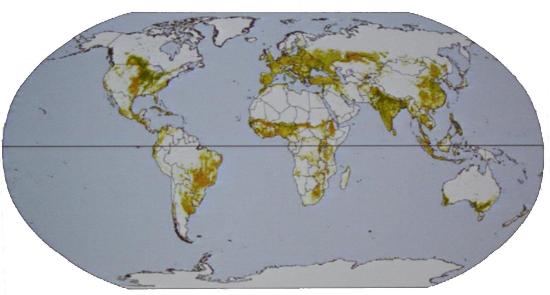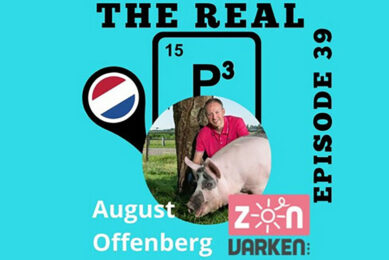The year 2050

There is no escape. The year 2050 has become sort of a magic number. It’s the new, hot focus point for agricultural projections.
The tendency, heard in projections for 2050 often is the same. The United Nations Food and Agriculture Organization (FAO) has projected a staggering 9 billion souls will be living on Earth by then. Most of them will have more money to spend, which will lead to an expected doubling in the demand to both meat and dairy products – so the question at many congresses nowadays is: how to feed them all?
Four additional planets Earth would be needed, said Nutreco CEO Wout Dekker last year, during the Agri Vision conference in the Netherlands.
We need genetically modified crops, Dr Jason Clay, World Wildlife Fund, said at that same congress – otherwise no wildlife will survive until 2050 due to a lack of living space.
Salzburg
At the time, I thought the discussions were interesting. Last week, however, I started to see ‘interesting’ may not be the right way to look at it. The year ‘2050’ once more was a theme at Biomin’s World Nutrition Forum, held in Salzburg, Austria.
Dr Gérard Gaillard, Agroscope, Switzerland, presented an approach of Life Cycle Assessment for farm production. Initially, he measured how alternative nutrition programmes could reduce a layer farm’s carbon footprint – and thus be more sustainable.
He concluded, saying, “Due to its basic principles […] and the flexibility of its implementation […], Life Cycle Assessment has proven to be a powerful framework for assessing the environmental impacts of agricultural production.”
His presentation had barely ended – or quite a few rumours could be heard from the audience. Delegates, merely advocating agriculture in developing countries clearly did not agree with this approach. One commenter said: “It is a display of ignorance and arrogance as how this is imposed on the rest of the world.”
Applause was what followed – and heavy debates could be heard in the following coffee break. One advocate of the last viewpoint emphasised that the developed world cannot deny the developing world to enjoy the same abundant luxury as the West has done. A different view was tabooed.
Moral right
I feel confused – 2050 seems holy, but everybody claims its moral ‘right’, blocking further discussion. In 2050, we need twice as much food (i.e. animals, crops), to meet everyone’s increased demands. In 2050, we need to care for national parks, wildlife, rainforests, sea fauna. In 2050, we need to produce sustainably so we will not put any pressure on the environment. In 2050, animals should be treated with care during production.
And – one would almost forget – we need to accommodate guaranteed, spacious and odour-free living space for an additional 2.3 billion people, since we are already with 6.8 billion people on the planet.
Crop production
Where will this all happen, Dr Frank Mitloehner, University of California-Davis showed in Figure 1, also previously published by the FAO, in 2006. It shows available land for crop production. Large parts of the world are not available for crop production, due to mountainous areas, or deserts. It’s no surprise that in those areas the majority of the people will not be found either.
Figure 1. Distribution of cropland (FAO, 2006).
Efficiency improvement, he said, will be key to meet these demands. Giant steps in efficiency improvement, however, cannot be found in the developed world anymore, he added. Cattle, pigs, poultry in the developed world are already producing very efficiently. Those steps ought to be made in the developing world.
Despair came onto me, however, when he mentioned that in that same developed world, these same efficient cattle, pig and poultry producers are being villified for producing industrially – or even told to move or shut up shop due to odour legislation.
So, part of the solution was found by the West’s very own agricultural producers – but they sometimes seem to be no longer wanted. Is becoming vegetarian than really the only option?
Mother Nature
I don’t think so. There is one underlying reason why all these problems happen. Perhaps we have to understand that Mother Nature did not design Planet Earth for 9.1 billion human inhabitants.
Thomas Malthus, an economist and demographer living in England in the 18th and 19th century, shared this view. In his 1798 Essay on the Principle of Population, he stated that eventually humans will reproduce so greatly that they would go beyond the limits of food supplies. In this respect, the 1349 epidemic of the Black Death, which was most likely caused by the bubonic plague, has often been attributed to ‘a Malthusian crisis’. Average casualty estimates among the population in Europe alone vary from 22 to 50%.
I am not a pessimist like Thomas Malthus. I think we can solve and prevent a crisis like this. But to do so, the World needs a global, all-encompassing approach towards 2050. For that, discussions are needed in which people are willing to listen and learn – without any taboos on whatever side.











